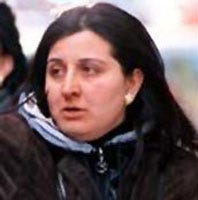An article of mine has appeared in The Spectator about the rather passive but essential role played by the women of the Mafia. But there have been Mafia women who have played active roles. This is especially true of the Camorra, which I will talk about elsewhere, but it even happened in ultra-conservative Sicily. But then, only once.
Giuseppina Vitale, known as Giusy, was born into a Mafia family in 1972, in Partinico, which is near Palermo. She had three brothers, all of whom were much older than her and were involved in the honoured society. Giusy started out young. At the age of six, she was carrying messages to imprisoned clan members. She left school at 13, as her brothers saw no point to her being educated, and she continued to run messages for the boys, and was well informed about the workings of the clan. Then came the day when every male member of the family was inside, and Giusy had to take over the running of the clan. That was in April 1998, but her tenure at the top was brief, as she was arrested a mere two months later, along with many other mafiosi, as a result police electronic surveillance operation. She went down for six years, sentenced for the crime of association with the Mafia. She was released four years later, but was back inside within a year, this time for commissioning a murder, of a local businessman called Salvatore Riina (same name as the famous boss, but no relation).
Giusy until then had been a Mafiosa of the old school, an adept keeper of secrets, and pretty ruthless with it. Then, while in prison, she was approached by a pentito, a ‘repentant one’, who managed to turn her. She gave away all the secrets, and has now entered witness protection under a new identity.
Why did she repent? It seems what made her change was the thought of her children. She did not want them to grow up with a mother in prison. What broke her was one of her children, then aged six, coming to prison and asking ‘Mummy, what does the word Mafia mean?’ Her reaction to this line of questioning was as follows: ‘I did not know how to respond. I took him in my arms, I got him to sit down and I tried to say something. I told him that the Mafia was an ugly thing and when he was grown up, I would try to explain it to him.’
So it was family feeling, a question from her little son, rather than interrogation from anyone else, that made Giusy change. Being a Mafia boss was one thing, but being an Italian Mamma was far more important. Family feeling triumphed.
However, repenting came at a price. Her brothers were not happy. "We disown her whether she's living or dead," her brother Leonardo said. "And we hope it's the latter, and as quickly as possible." He, along with the rest of the clan, is under lock and key in carcere duro in the far north of Italy, but his threats are certainly to be taken seriously.
Giusy’s story is emblematic of the role of Mafia women for several reasons. First of all, she was under the thumb of her brothers from a tender age; of course, she stressed that she was exploited by them, naturally enough, but that does not mean it was not true. She was a perfectly capable boss, but, and here is the rub, unlike other Mafiosi, she was not prepared to take the rap when it came, she was not prepared to spend decades in prison, simply because she was a mother.
It used to be argued, perhaps it still is, that women in the armed forces could not be in front line combat roles because they were mothers and as such irreplaceable. If that argument holds for the armed forces, it certainly holds for the Mafia. Giusy Vitale illustrates why a woman cannot be a Mafia boss. They are simply not hard hearted enough.



